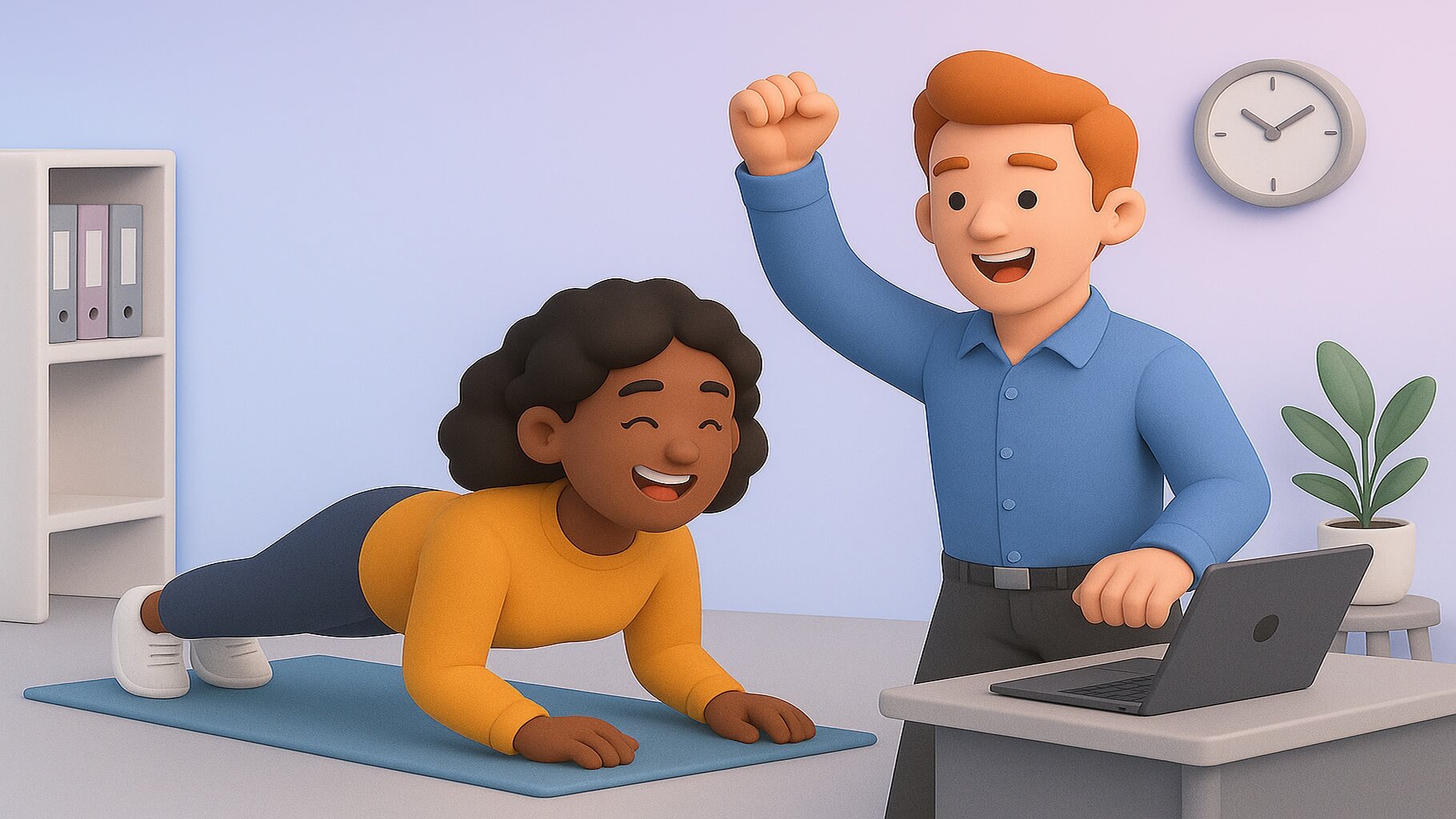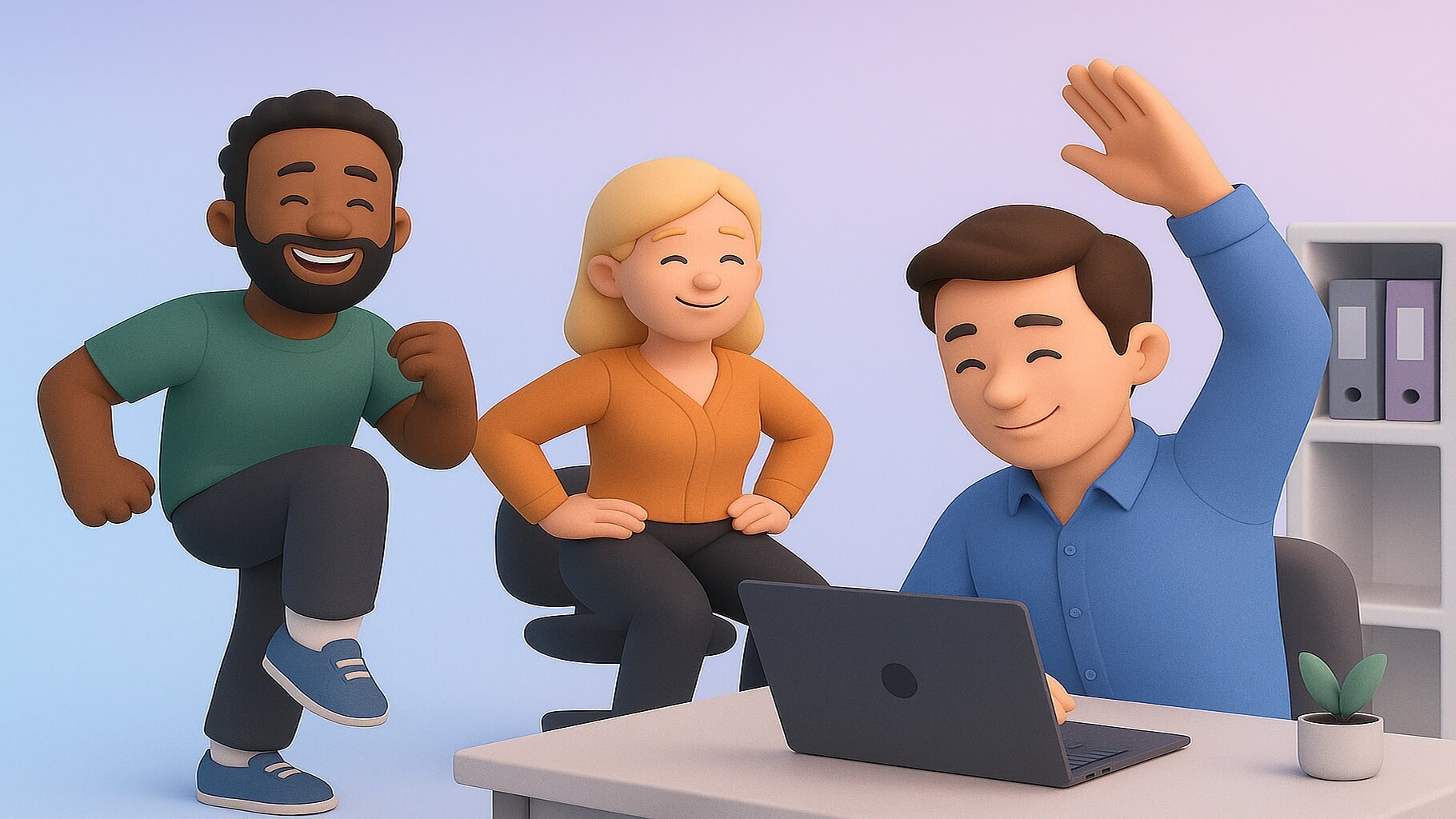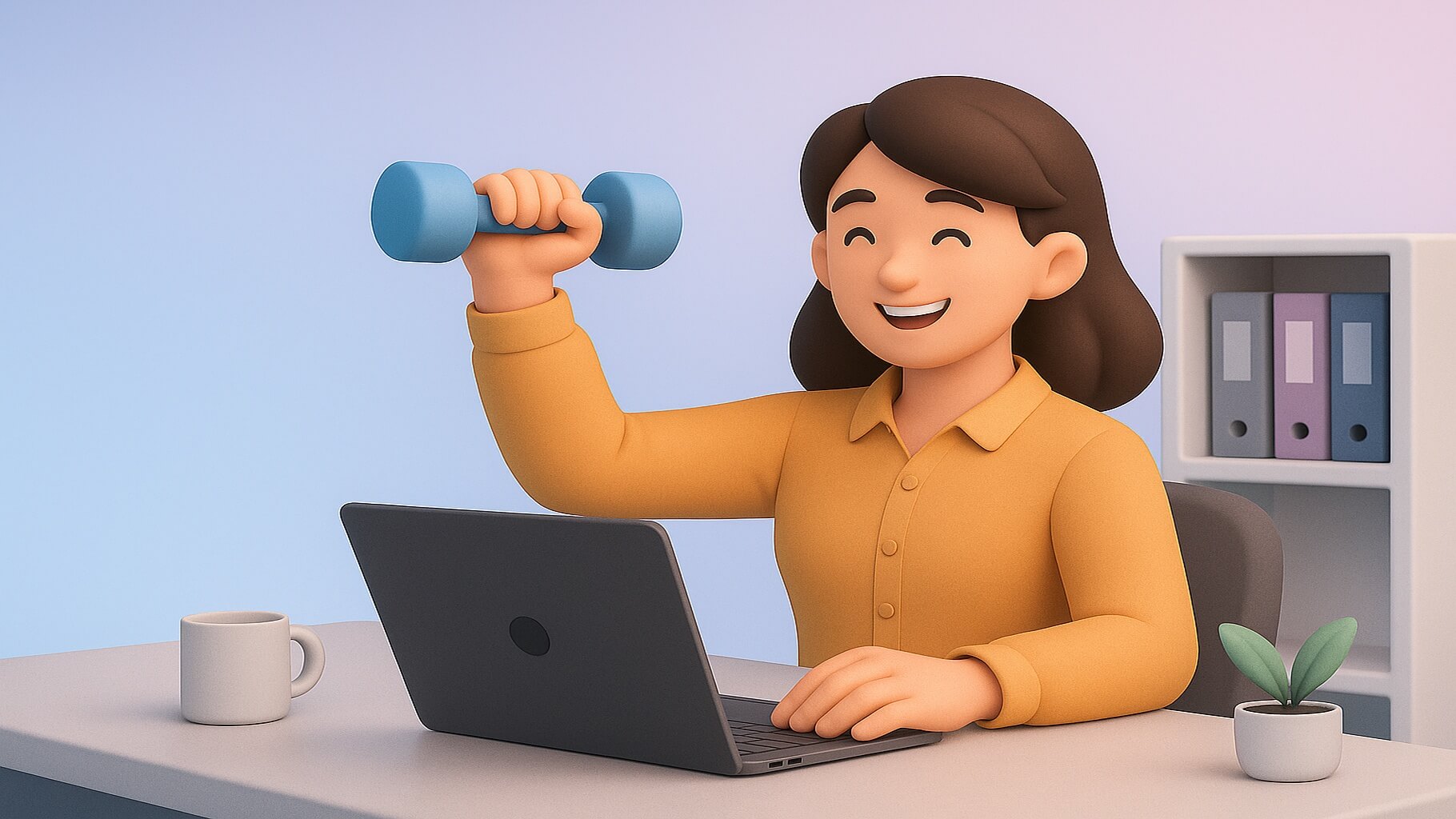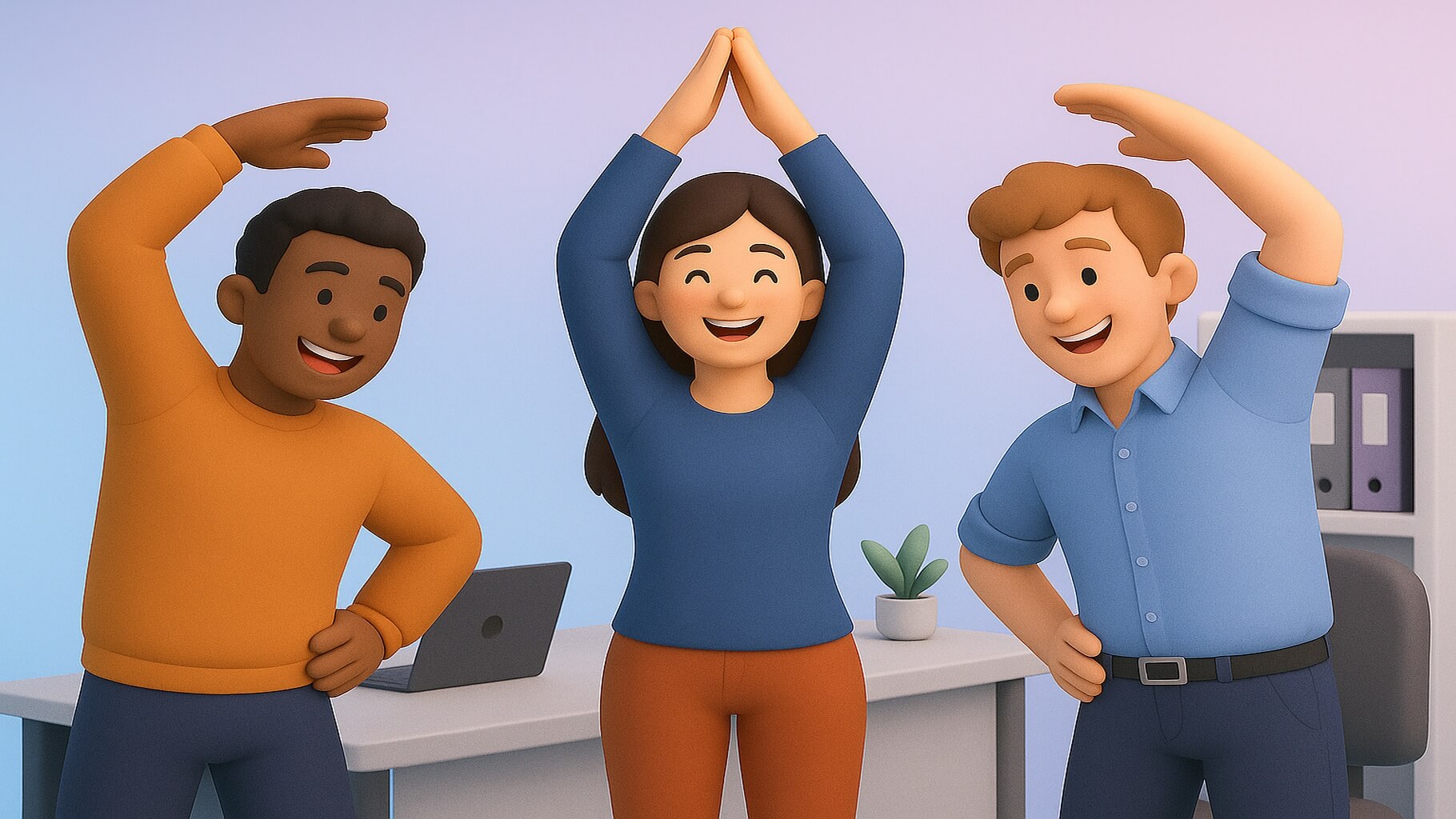
More than just good intentions are required to create a workplace culture of health and fitness. At Matter, we understand that companies face unique challenges when creating engaging workplace fitness challenges that inspire employees to adopt healthier habits. From remote work arrangements to diverse fitness levels and busy schedules, organizations need creative solutions that encourage participation while respecting individual preferences and capabilities.
The most successful wellness initiatives combine physical activity with recognition, transforming fitness from an obligation into an enjoyable team-building experience. This comprehensive guide offers over 41 innovative fitness challenge ideas designed to enhance employee health, foster team camaraderie, and cultivate a positive work environment where healthy behaviors flourish. Whether you're looking to implement step-based competitions, mental wellness activities, or technology-driven fitness trackers, these proven strategies will help you build an employee wellness program that drives real engagement and lasting results.
What are workplace fitness challenges, and why implement them?

Corporate wellness programs have evolved significantly beyond basic gym memberships to encompass comprehensive approaches addressing both physical and mental health needs. Modern employee wellness challenges create structured opportunities for teams to adopt healthier habits while building stronger connections across departments. These wellness initiatives range from simple walking challenges that track progress daily to complex team-based competitions incorporating nutrition education, sleep challenge components, and stress management elements designed to improve overall employee well-being.
The shift toward holistic wellness reflects growing recognition that healthy employees demonstrate higher engagement, productivity, and job satisfaction rates. By implementing diverse fitness challenge ideas through a well-structured employee wellness program, organizations demonstrate genuine investment in their workforce while creating a good work environment that attracts and maintains exceptional talent. Many wellness programs now integrate mental wellness components alongside physical fitness, creating comprehensive health solutions that address the whole person rather than just physical activity metrics.
Understanding fitness challenges for workplace success
Structured office fitness challenges serve as powerful tools within corporate wellness frameworks, encouraging employees to increase their physical activity levels through friendly competition and collaborative goal-setting. These initiatives typically run for specific timeframes with measurable objectives, offering wellness incentives that motivate participation while accommodating different fitness interests and abilities. A successful office fitness challenge strikes a balance between individual achievement and team challenge dynamics, ensuring that everyone can participate meaningfully, regardless of their starting fitness level.
Key components of effective fitness challenges include:
- Clear objectives aligning with broader wellness initiatives and desired health behaviors
- Inclusive activities accommodating various physical fitness levels and personal limitations
- Robust progress tracking systems that provide real-time feedback and encourage employees
- Recognition frameworks celebrate both participation efforts and achievement milestones
- Seamless integration with existing workplace wellness programs for consistent messaging
Benefits of workplace wellness challenges
Implementing comprehensive wellness challenges yields measurable benefits that extend far beyond simple physical health improvements. These programs create positive ripple effects throughout organizations, enhancing workplace dynamics while supporting better mental health outcomes and stronger team relationships. Corporate fitness initiatives consistently demonstrate value through both quantitative metrics, such as reduced healthcare costs, and qualitative improvements in employee morale and workplace culture.
Organizations investing in structured workplace fitness challenges typically experience:
- Reduced healthcare costs through preventive health behaviors and early intervention
- Increased productivity from employees maintaining better mental health and energy
- Stronger team cohesion through shared fitness goals, creating healthy competition
- Lower absenteeism rates as teams develop consistent, healthy habits together
- Enhanced recruitment appeal for health-conscious talent seeking comprehensive benefits
What are some fitness challenges that work?
The most effective workplace fitness programs strike a balance between simplicity and engagement, making participation easy while maintaining motivation throughout the successful wellness challenge lifecycle. Evidence shows that incorporating fun team challenges alongside traditional fitness activities significantly increases participation rates and long-term adherence. Successful challenges leverage gamification elements, peer support systems, and adaptable work schedules to meet the varied demands and preferences of staff members.
Evidence-based approaches that drive participation include:
- Short-duration challenges maintain momentum while building sustainable habits
- Multiple participation options within engaging fitness challenges for all abilities
- Real-time tracking through apps or fitness trackers provides immediate feedback
- Team-based formats leveraging peer support to create accountability and fun
- Clear communication about rules, rewards, and progress throughout the program
12 workplace fitness challenge ideas for physical activity

Creating diverse opportunities for physical activity ensures that every employee finds meaningful ways to participate in structured wellness initiatives, regardless of their current fitness level or personal preferences. These 12 fitness challenge ideas offer comprehensive approaches to increase daily movement, build cardiovascular health, and develop sustainable healthy eating habits that extend well beyond the challenge period. Each option can be customized to fit an organization's culture and available resources, while maintaining a focus on improving employee health through regular physical activity and supporting both physical and mental health outcomes.
12 proven challenges to boost physical fitness:
- Daily step competitions with tiered goals - Design walking challenge frameworks with multiple achievement levels (5,000, 8,000, 10,000 steps) that engage employees across fitness spectrums while using fitness trackers for accurate monitoring
- Office Olympics with departmental teams - Organize multi-event team workout challenges, including relay races, obstacle courses, and skill-based activities that challenge employees physically while building interdepartmental relationships
- Stair climbing challenge with floor tracking - Transform everyday movement into fitness by counting total floors climbed daily, perfect for improving cardiovascular health in multi-story office environments
- Lunch walk clubs with rotating routes - Establish regular groups exploring different paths that encourage participation through social connection and varied scenery
- Progressive plank challenge programs - Build core strength starting with 30-second holds and gradually increasing duration, creating achievable goals for all fitness levels
- Active commute competitions - Within your workplace wellness program framework, reward employees choosing bikes, walking, or running for transportation as part of healthy lifestyle choices
- Weekend warrior photo challenges - Encourage sharing weekend physical activity photos, building community while promoting work-life balance
- Department vs. department fitness battles - Create engaging competitions between teams with varied activities, promoting healthy competition and collaboration
- Monthly distance accumulation contests - Use fitness trackers monitoring total miles walked, run, or cycled by individuals or teams throughout the month
- Bodyweight exercise pyramids - Design a successful office fitness challenge using progressive push-ups, squats, and equipment-free exercises
- Fitness bingo cards - Create cards featuring various activities that engage employees throughout the month and reward employees for completing different squares
- Virtual race participation - Organize group sign-ups for charity 5Ks or virtual events as part of corporate wellness community building
Step-based workplace fitness challenges
Step challenges remain popular within office wellness programs because they provide accessible, measurable ways for everyone to participate, regardless of their fitness background. These programs work particularly well for encouraging employees who might feel intimidated by intense fitness activities, as they offer achievable goals that help build confidence. Organizations create inclusive programs by offering multiple goal tiers and recognizing improvement percentages rather than just absolute numbers, helping participants adopt healthier habits at comfortable paces while building a positive workplace culture through shared experiences.
Effective step challenge variations promoting employee morale include:
- Team average challenges fostering collaboration over competition and inclusive participation
- "Most improved" categories within office fitness challenge ideas, rewarding progress journeys
- Themed walking events tied to virtual destinations or charitable causes for engagement
- Integration with corporate fitness platforms enables automated tracking and real-time updates
Strength and flexibility challenges
Building comprehensive physical fitness requires more than cardiovascular exercise, making strength and flexibility essential components within employee fitness challenge frameworks. These activities help prevent workplace injuries, improve posture for desk workers, and boost sustained energy levels throughout demanding workdays. Simple bodyweight exercises performed in office settings without special equipment make these challenges accessible, while progressive difficulty levels maintain engagement over time.
Popular strength and flexibility options that challenge employees include:
- Progressive plank challenge competitions starting at manageable durations and building endurance
- Desk yoga sequences performed during scheduled breaks improve both flexibility and mental wellness
- Resistance band workouts are distributed to remote workers as part of inclusive wellness initiatives
- Flexibility improvement contests measuring range of motion gains and celebrating progress
Team-based fitness competitions
Incorporating structured team challenges into workplace fitness programs leverages powerful social dynamics that encourage participation while creating accountability among colleagues. These formats excel at building positive work environment characteristics while pursuing shared fitness goals that benefit everyone. By strategically combining employees from different departments in team challenge formats, organizations enhance cross-functional relationships and communication, while supporting overall health improvements through collaborative efforts.
Successful team competition formats for building mental wellness include:
- Relay-style events combining various fitness activities and movement challenges creatively
- Cumulative team mileage goals with shared tracking systems and regular progress celebrations
- Department wellness challenges featuring rotating monthly focuses on different health aspects
- Partner accountability programs pair employees with similar goals and complementary strengths
10 fun fitness challenges for the workplace

Injecting fun into fitness initiatives transforms obligatory wellness activities into engaging experiences that employees actively anticipate and discuss. These creative approaches within the office challenges combine entertainment value with genuine health benefits, making it easier to engage employees who might otherwise avoid traditional exercise programs. By prioritizing enjoyment alongside fitness outcomes, organizations cultivate sustainable wellness cultures that support long-term behavior change and foster lasting healthy lifestyle choices, extending beyond the workplace walls.
10 engaging fitness challenges to energize your team:
- Office dance-off competitions - Host weekly dance breaks featuring themed music and simple choreography that encourage participation across all fitness levels
- Scavenger hunt fitness races - Combine problem-solving with physical activity throughout office spaces or campus grounds to engage employees creatively
- Themed costume workout days - Within fun fitness challenges for the workplace framework, encourage participation with entertaining themes like "80s aerobics" or "superhero training."
- Fitness trivia challenges - Mix physical exercises with health-related quiz questions that educate while activating bodies and minds
- Musical chairs fitness edition - Incorporate exercises between rounds of this classic game to boost employee morale through nostalgia
- Balloon volleyball tournaments - Low-impact, high-fun activity suitable for all fitness levels within inclusive workplace fitness programs
- Hula hoop endurance contests - Simple equipment providing core strengthening and laughter during team challenge events
- Office mini-golf with fitness stations - Add exercise requirements at each hole, creating engaging fitness challenges throughout play
- Freeze dance fitness breaks - Spontaneous movement sessions boosting energy while improving mental health through play
- Paper airplane distance challenges - Combine creativity with movement as teams design, launch, and retrieve planes repeatedly
Gamified fun fitness challenges for the workplace
Gamification transforms routine physical activity into engaging adventures that tap into employees' natural competitive spirits within comprehensive employee engagement challenges. These challenges utilize game design elements, including points, levels, badges, and rewards, to make fitness feel less like work and more like play. Modern wellness programs are increasingly incorporating sophisticated gamification elements, which help maintain long-term engagement while facilitating effective progress tracking through automated systems.
Effective gamification strategies for workplace fitness include:
- Point systems recognizing various healthy behaviors beyond simple exercise completion
- Achievement badges celebrate specific milestones or trying new activities within wellness challenges
- Dynamic leaderboards highlighting different metrics to engage employees with varied strengths
- Collaborative team quests require cooperation to unlock group rewards and recognition
Seasonal workplace challenges for fitness
Aligning fitness challenges with seasons creates natural variety while addressing weather-related exercise barriers within comprehensive workplace wellness initiatives. These timely programs help teams maintain consistent physical activity throughout the year while celebrating seasonal themes and holidays that resonate culturally. Seasonal challenges offer regular refresh opportunities to re-engage employees who may have lost momentum, utilizing novelty and themed activities to encourage participation through creative programming.
Popular seasonal fitness activities promoting healthy habits include:
- Spring cleaning fitness challenges, combining organization tasks with movement and physical activity
- Summer outdoor adventure competitions highlighting local parks and trails for team challenge exploration
- Fall harvest-themed wellness challenges, incorporating seasonal produce and healthy food choices education
- Winter indoor activity circuits are designed specifically for cold weather months, maintaining fitness goals
Creative movement challenges
Breaking away from traditional exercise formats helps engage employees who don't identify as "fitness people" within diverse employee challenges programming. Creative movement challenges incorporate artistic, playful, or unconventional activities, still providing significant health benefits while improving mental wellness outcomes. These innovative approaches particularly appeal to employees seeking mental health support alongside physical activity improvements, creating holistic wellness experiences.
Innovative movement challenges inspiring participation include:
- Workplace drumming circles combine rhythm with upper body movement and stress relief benefits
- Walking meeting challenges transforming sedentary discussions into active, collaborative sessions
- Improv movement sessions focusing on spontaneous physical expression and creative freedom
- Photography walks combining artistic creativity with step goals and mindful observation practices
8 workplace wellness challenge ideas beyond fitness

Comprehensive employee wellness programs recognize that true health extends far beyond physical fitness alone to encompass mental, emotional, and social well-being dimensions. These eight wellness challenges address often-overlooked health aspects that significantly impact employee morale and productivity within any successful wellness framework. By expanding beyond traditional exercise-focused initiatives, organizations can create inclusive wellness programs that resonate with diverse employee populations while supporting overall health improvements through varied approaches that help employees adopt healthier habits holistically.
8 holistic wellness challenges for complete health:
- 21-day gratitude challenge with daily journaling - Employees document three daily gratitudes, improving mental wellness and positive thinking patterns consistently
- Mindful eating workshops with food diaries - Focus on conscious consumption patterns, establishing sustainable, healthy eating habits for life
- Digital detox challenges limiting screen time - Encourage regular device breaks, achieving better mental health, and work-life balance
- Hydration tracking competitions - Monitor daily water intake using team-based goals supporting fundamental healthy behaviors
- Sleep challenge improving rest quality - Track sleep hours while implementing better bedtime routines for enhanced mental well-being
- Stress reduction meditation series - Daily guided sessions within corporate wellness frameworks focusing on mental health management
- Healthy recipe exchanges - Employees share nutritious meal ideas and healthy food choices, promoting better nutrition
- Financial wellness challenges - Budget tracking and savings goals within wellness incentives, reducing money-related stress
Nutrition-focused workplace wellness challenges
Supporting healthy eating through structured challenges helps employees make better food choices, fueling both body and mind within comprehensive health and wellness initiatives. These programs range from simple awareness campaigns to comprehensive nutrition education within workplace fitness frameworks that address whole-person health. Successful nutrition challenges strike a balance between practical education and hands-on application, making it easier for employees to develop sustainable, healthy eating habits while participating in engaging workplace wellness activities.
Effective nutrition challenge components encouraging participation include:
- Weekly meal prep competitions sharing healthy recipes and time-saving techniques for professionals
- Produce a variety of challenges, encouraging employees to explore new fruits and vegetables as healthy food choices
- Sugar reduction initiatives providing alternative snack options supporting sustainable, healthy lifestyle choices
- Team cooking demonstrations featuring nutritious, budget-friendly meals promoting overall wellness affordably
Mental health and stress reduction challenges
Prioritizing mental health through dedicated wellness challenges demonstrates a genuine organizational commitment to comprehensive employee well-being within any workplace wellness program structure. These initiatives offer practical tools and techniques for managing stress effectively, enhancing emotional resilience, and achieving better long-term mental health outcomes. Creating psychologically safe spaces for mental wellness discussions reduces stigma, encourages help-seeking behaviors, and fosters truly positive work environment cultures.
Impactful mental wellness activities that encourage employees include:
- Daily meditation or breathing exercise practices integrated into work fitness challenge schedules naturally
- Structured gratitude challenge exercises focusing on positive thinking and appreciation development
- Stress management workshops provide practical coping strategies for workplace pressures
- Peer support groups facilitate experience sharing and solution discovery within supportive frameworks
Sleep and recovery wellness initiatives
Quality sleep forms the foundation supporting both physical and mental health; yet, many employees struggle with adequate rest in demanding modern work environments. Sleep-focused wellness challenges help establish better bedtime routines while highlighting critical connections between rest quality and performance outcomes. These initiatives often reveal surprising insights into how participating in sleep challenge programs significantly impacts workplace productivity, safety, and overall employee well-being.
Components of successful sleep challenges improving health behaviors include:
- Sleep tracking using apps or journals, identifying patterns, and improvement opportunities systematically
- Evening routine challenges eliminating screens before bed for enhanced rest quality
- Strategic workplace nap room utilization for restorative rest breaks during demanding periods
- Comprehensive education about sleep hygiene and environmental optimization for restorative sleep
6 office fitness challenges for desk workers

Sedentary work environments pose unique health challenges that require targeted interventions to mitigate the negative effects of prolonged sitting. These six office fitness challenge ideas specifically address the needs of desk workers by incorporating movement seamlessly into regular workdays without requiring gym equipment or extended time away from workstations. Each challenge adapts easily to both in-office and remote work settings, ensuring all employees can participate meaningfully regardless of their location, while improving cardiovascular health and reducing workplace-related health issues.
6 desk-friendly fitness solutions:
- Hourly movement alarms - Set consistent reminders for 2-minute activity breaks every hour, combating sedentary behavior patterns
- Desk exercise circuits - Rotate through seated leg lifts, desk push-ups, and chair dips as accessible office fitness challenge ideas
- Walking meeting initiatives - Convert routine phone calls and one-on-ones into walking sessions that naturally encourage participation
- Posture improvement challenges - Implement daily check-ins and targeted exercises for better alignment, reducing chronic pain
- Lunch hour fitness classes - Offer quick 20-30 minute sessions in conference rooms, fitting busy professional schedules
- Stairwell workout programs - Utilize building stairs creatively for cardio and strength training within workplace fitness initiatives
Quick desk-based office fitness challenges
Creating movement opportunities within workspaces helps employees maintain consistent physical activity, even during busy periods, within any corporate fitness framework. These micro-workouts effectively counteract the negative effects of prolonged sitting while boosting energy and mental focus throughout the workday. Quick desk exercises performed in professional attire without special equipment remove common exercise barriers, making it significantly easier to adopt healthier habits consistently.
Effective desk-based activities that challenge employees include:
- Seated spinal twists and shoulder rolls are performed hourly for flexibility maintenance
- Standing desk challenges encourage regular position changes throughout workdays
- Resistance band exercises are stored conveniently in desk drawers for strength training
- Balance challenges using single-leg stands during phone calls, improving stability
Lunchtime fitness activities
Maximizing lunch breaks for physical activity provides substantial health benefits without extending workdays within any successful office fitness challenge structure. These midday fitness opportunities help employees return to afternoon tasks refreshed and energized while gradually building healthy habits. Successful lunchtime programs offer variety and flexibility, accommodating different schedules and fitness interests while actively promoting employee morale through shared experiences.
Popular lunchtime fitness options encouraging employees include:
- Express yoga sessions in multipurpose rooms, focusing on stress relief and flexibility improvement
- Walking clubs exploring nearby neighborhoods or parks for cardiovascular health benefits
- Quick HIIT workouts designed for efficient 20-minute completion with maximum impact
- Targeted stretching circles addressing areas affected by desk work and repetitive strain
Stretching and posture challenges
Poor posture from extended computer use contributes to numerous health issues, including chronic back pain, tension headaches, and decreased productivity within modern work environments. Stretching and posture challenges address these widespread concerns through targeted exercises and awareness campaigns integrated into comprehensive wellness initiatives. Regular movement breaks additionally improve circulation and reduce muscle tension while supporting better mental health through physical relief mechanisms.
Essential stretching and posture improvements for employee well-being include:
- Neck and shoulder release sequences are performed twice daily for consistent tension relief
- Ergonomic assessments establish posture correction goals with measurable progress tracking
- Hip flexor stretches specifically countering the prolonged sitting effects on lower body health
- Structured eye exercise breaks reduce digital strain while improving focus capacity
5 technology-driven fitness challenges for the workplace

Modern wellness programs utilize advanced technology to boost engagement levels, streamline progress tracking processes, and foster more engaging fitness experiences within corporate wellness frameworks. These five technology-driven challenges utilize apps, wearables, and virtual platforms, making participation convenient and enjoyable while gathering valuable data insights. By embracing digital tools strategically, organizations can effectively support remote workers, consistently provide real-time feedback, and create data-driven wellness initiatives that demonstrate measurable results and reward employees meaningfully.
5 innovative tech-powered fitness challenges:
- App-based team competitions with real-time leaderboards - Utilize platforms syncing with various fitness trackers for inclusive tracking and sustained engagement
- Virtual reality fitness experiences - Introduce immersive VR workout sessions providing unique, engaging exercise options that challenge employees creatively
- AI-powered personalized workout challenges - Customize fitness plans based on individual goals with automated track progress capabilities
- Social media fitness campaigns - Create viral hashtag challenges for sharing workout achievements and building community connections
- Wearable device step battles - Leverage smartwatches and fitness trackers, enabling automated competition tracking and instant rewards
App-based fitness tracking challenges
Mobile applications revolutionize employee engagement with wellness programs by providing convenient access to challenges, sophisticated progress tracking features, and social elements within any employee wellness program structure. These platforms enable organizations to offer diverse fitness challenges while gathering valuable participation data and health outcomes. Successful app-based programs strike a balance between automation benefits and personal touch elements, maintaining consistent engagement and encouraging participation throughout challenging periods.
Key features of effective fitness apps engaging employees include:
- Seamless integration with multiple wearable devices and fitness trackers for comprehensive data collection
- Dynamic social feeds allow employees to encourage and celebrate each other's achievements
- Customizable challenges accommodating different fitness goals and ability levels inclusively
- Comprehensive analytics dashboards for participants and administrators to track progress effectively
Virtual fitness competitions
Remote and hybrid work arrangements necessitate innovative solutions for fostering team connections through fitness activities within modern workplace wellness programs. Virtual competitions enable geographically dispersed employees to participate in shared wellness experiences, building genuine camaraderie. These digital events effectively replicate the energy of in-person challenges while offering greater flexibility and inclusivity for all participants, regardless of their location or time zone differences.
Successful virtual competition formats promoting healthy competition include:
- Global step challenges connecting offices across time zones and diverse cultures
- Video-based fitness class participation tracking with live instructor feedback capabilities
- Photo submission contests documenting various physical activities and personal achievements
- Live-streamed group workouts featuring real-time interaction and motivational support
Wearable device integration ideas
Fitness trackers and smartwatches provide unprecedented opportunities for accurate activity monitoring and personalized goal setting within comprehensive wellness programs. Organizations leverage these devices to create sophisticated wellness challenges that track multiple health metrics beyond basic step counts. Wearable integration significantly reduces the administrative burden through automated data collection, while providing valuable insights into overall health patterns and opportunities for improvement.
Innovative wearable device challenges for employee health include:
- Heart rate zone training competitions optimizing cardiovascular health improvement outcomes
- Sleep quality improvement contests utilizing device sleep tracking advanced capabilities
- Active minute accumulation tracking across various exercise types and intensity levels
- Stress level reduction challenges using built-in stress monitoring features effectively
How to implement successful workplace fitness challenges
Creating impactful wellness initiatives requires strategic planning, thoughtful execution, and ongoing refinement based on employee feedback and participation data within any corporate wellness program framework. Successful implementation extends far beyond simply announcing new fitness challenges to building comprehensive support systems that genuinely encourage participation while celebrating achievements in a meaningful way. Organizations must carefully consider diverse employee needs, available resources, and organizational culture when designing programs that will authentically engage employees and create lasting behavior change toward healthy lifestyle choices.
Well-implemented fitness challenges become catalysts for broader cultural transformation, establishing wellness as a core organizational value rather than a temporary initiative. This section provides actionable strategies for launching, managing, and optimizing workplace wellness challenges, delivering measurable results for both employees and organizations while building a genuinely positive workplace culture.
Choosing the right fitness challenges for the workplace culture
Selecting appropriate wellness challenges requires careful consideration of organizational dynamics, employee demographics, and available resources to create truly successful wellness challenge implementations. The most effective office fitness challenge ideas naturally align with existing company values while addressing specific health goals identified through comprehensive employee surveys or health assessments. Cultural fit ultimately determines whether employees perceive challenges as genuine expressions of organizational care or merely as checkbox exercises within wellness initiatives.
Essential factors for challenge selection, encouraging employees include:
- Current employee fitness levels and health interests were discovered through comprehensive survey data
- Available facilities, budget allocations, and time allowances for wellness activities and programs
- Existing wellness program infrastructure and support systems enable smooth implementation
- Visible leadership commitment to modeling healthy behaviors and actively supporting participation
Tracking and measuring the challenge success
Effective measurement systems provide crucial insights that guide program improvements and demonstrate a clear return on investment to stakeholders within any workplace wellness program. Modern wellness programs utilize diverse metrics beyond simple participation rates to understand the comprehensive impact of the program on employee health, engagement levels, and productivity outcomes. Regular progress tracking also helps maintain participant motivation throughout challenges, while identifying areas that require enhancement or adjustment.
Key metrics for evaluating fitness challenges and wellness incentives include:
- Participation rates across different employee segments and geographic locations are comprehensively
- Health outcome improvements, including biometric changes and self-reported wellness metrics
- Employee satisfaction scores and qualitative feedback about the overall program experience
- Business impact metrics, including absenteeism rates, productivity measures, and healthcare cost trends
Overcoming common implementation barriers
Every organization faces predictable obstacles when launching workplace fitness challenges, from initial low participation to ongoing resource constraints limiting program scope. Anticipating and proactively addressing these barriers increases program success rates and fosters sustained employee engagement, ultimately building a truly sustainable wellness culture. Common challenges include competing work priorities, diverse fitness levels among staff, and skepticism about organizational motives behind wellness initiatives.
Strategies addressing implementation challenges to encourage participation include:
- Create genuinely flexible participation options, accommodating various schedules and abilities
- Provide crystal-clear communication about program benefits and completely voluntary participation
- Offer multiple reward types beyond monetary incentives, appealing to different motivations
- Build strong peer champion networks, encouraging participation and providing ongoing support
How Matter enhances workplace wellness challenges
Matter transforms traditional workplace wellness challenge management with innovative features designed specifically for modern organizations seeking to reward employees meaningfully and boost engagement through comprehensive wellness programs. The platform seamlessly integrates fitness achievements with peer recognition systems, creating unified frameworks that celebrate both individual progress and team accomplishments within any work fitness challenge structure. By combining wellness tracking capabilities with Matter's proven kudos system, organizations can build sustainable cultures of health and appreciation, consistently improving employee well-being.
Our platform recognizes that implementing truly successful wellness challenge programs requires more than just tracking tools and basic reporting capabilities. Matter provides essential social infrastructure needed to maintain momentum, celebrate meaningful milestones, and create genuine connections around shared health goals, while effectively supporting corporate wellness objectives. This holistic approach ensures that fitness challenges become integral parts of a recognition culture, rather than standalone wellness initiatives, creating a lasting, positive impact on workplace fitness and overall employee health outcomes.
Recognition features for fitness achievements
Matter's customizable kudos cards provide perfect vehicles for celebrating fitness milestones and encouraging continued participation in wellness challenges throughout organizations. Employees send beautifully designed recognition messages to celebrate completing challenges, achieving personal bests, or supporting teammates during their fitness journeys. This peer-to-peer recognition significantly amplifies the positive impact of wellness programs by adding meaningful social validation to personal achievements while building a positive workplace culture organically.
Platform features for fitness recognition engaging employees include:
- Custom kudos categories specifically designed for wellness achievements and health milestone celebrations
- Automated milestone celebrations triggered by challenge completions and goal achievement verification
- Seamless integration with existing wellness platforms, triggering recognition for verified accomplishments
- Weekly coin refresh system ensures consistent recognition opportunities throughout extended challenges
Team leaderboards and progress tracking
Creating healthy competition through transparent progress tracking motivates continued participation while building stronger team cohesion within any employee wellness program structure. Matter's sophisticated leaderboard functionality extends beyond simple rankings to highlight various achievement categories, ensuring employees across all fitness levels feel recognized and valued equally. The platform's comprehensive analytics provide administrators with actionable insights for optimizing challenge design and improving participation strategies that effectively reward employees.
Matter's tracking capabilities enable organizations to efficiently track progress through:
- Real-time challenge standings display across teams and individuals with automatic updates
- Celebration features for both absolute achievements and percentage improvements, ensuring inclusivity
- Automated progress report generation for participants and managers reviewing performance
- Engagement trend identification, improving future fitness challenge ideas, and program design
Automated rewards for challenge completion
Matter simplifies complex reward distribution through its comprehensive rewards system, allowing organizations to offer meaningful incentives without creating an administrative burden. The platform's unique coin-based system creates natural limits, encouraging thoughtful recognition while providing flexibility in reward selection options. Participants choose rewards that align with their personal preferences, from fitness-related gift cards to charitable donations, making wellness incentives more personally meaningful.
Automated reward features supporting wellness initiatives include:
- Instant reward delivery upon challenge completion verification, providing immediate gratification
- Diverse reward options, including fitness-related gift cards and premium wellness products
- Team-based reward pools encourage collaborative challenge achievements and group success
- Seamless integration with existing corporate wellness program reward structures, maintaining consistency
FAQs about workplace fitness challenges
Understanding common questions and concerns enables organizations to design more effective wellness challenges, addressing genuine employee needs and aligning with organizational goals within comprehensive health and wellness frameworks. These frequently asked questions address practical implementation aspects, including optimal duration and inclusivity considerations, as well as measurement strategies and long-term sustainability. Clear, actionable answers to these questions help build stakeholder confidence in program design, while encouraging broader participation across diverse employee populations and supporting overall employee well-being initiatives.
Here are the rewritten FAQs, shorter and without statistics:
Q: What are the most effective workplace wellness challenge ideas?
A: The most successful workplace wellness challenge ideas combine accessibility, engagement, and measurable outcomes. Step challenges are effective due to their ease of tracking and universal appeal. Team-based challenges leveraging peer support show higher completion rates than individual competitions. Short-duration challenges (4-6 weeks) maintain better momentum. The key is to offer variety that engages different interests and fitness levels while keeping participation requirements simple.
Q: How long should fitness challenges for the workplace run?
A: Most successful programs run 4-6 weeks to maintain engagement without causing participant fatigue. Shorter challenges (2-3 weeks) work for introducing new concepts or maintaining momentum between longer programs. Extended challenges beyond 8 weeks often see drop-offs unless refreshed with new elements. Consider sequential shorter challenges rather than single, lengthy programs.
Q: What are the best practices for creating inclusive fitness challenges?
A: Inclusive fitness challenges accommodate all ability levels, work schedules, and personal preferences. Offer multiple participation tracks with varying intensity levels. Focus on improvement rather than absolute performance to level the playing field. Include non-physical wellness options, such as meditation or nutrition goals. Ensure remote workers can participate equally through virtual options and provide alternatives for employees with disabilities.
Q: How can companies measure the success of workplace fitness programs?
A: Measure success through multiple metrics, including health outcomes, employee feedback, and engagement patterns. Track improvements in energy levels, stress reduction, and team collaboration. Collect regular feedback through surveys and monitor which activities generate the highest participation. Document culture shifts and peer recognition frequency. Successful programs show positive trends across multiple categories rather than excelling in just one area.
Q: What role should leadership play in workplace wellness challenges?
A: Leadership involvement is critical through visible participation and genuine support. Executives should actively participate, share their fitness journeys, and celebrate team achievements publicly. Leaders must allocate the necessary resources and communicate the program's importance through company channels. Most importantly, they create psychological safety where employees feel comfortable participating at their own pace without judgment.
Q: How can small businesses implement effective fitness challenges with limited budgets?
A: Small businesses can create effective fitness challenges by focusing on creativity over costly infrastructure. Use free fitness apps instead of expensive wearable devices, create walking groups using local parks, and organize bodyweight exercise challenges that require no equipment. Partner with local instructors to offer group rates and utilize peer recognition or extra time off as rewards. Build community through regular check-ins and team celebrations, rather than relying on expensive prizes.
Q: How can organizations maintain employee engagement throughout longer wellness challenges?
A: Keep engagement high by introducing weekly mini-challenges within larger programs and celebrating milestones at regular intervals to reward employees consistently. Create challenge ambassadors from enthusiastic participants who encourage employees and share tips while gathering mid-challenge feedback for real-time program adjustments.
Q: What strategies work best for engaging remote and hybrid employees in fitness challenges?
A: Use apps and fitness trackers that enable real-time participation from any location while hosting virtual group workouts that engage employees across distances. Design challenges around universally accessible activities, such as walking or bodyweight exercises, and create dedicated channels where remote participants can share achievements and build team connections.
Q: How should organizations handle employees who are resistant to participating in workplace wellness challenges?
A: Never pressure non-participants; instead, offer anonymous surveys to understand concerns and provide multiple entry points, including non-physical wellness options like mental health activities. Emphasize that participation is completely voluntary while sharing success stories from initially hesitant employees who found value in the programs.
Final thoughts on workplace fitness challenges
Creating lasting wellness cultures requires sustained commitment beyond individual fitness challenges to embed health and well-being into organizational DNA permanently. The most successful workplace fitness challenges serve as powerful catalysts for broader transformations, inspiring employees to prioritize personal health while building stronger connections with colleagues across departments. Organizations that view wellness initiatives as strategic investments in human capital, rather than operational costs, consistently achieve better returns through improved employee morale, significantly reduced healthcare expenses, and enhanced productivity across all business metrics.
As workplace dynamics continue to evolve with the prevalence of remote work and changing employee expectations, fitness challenges must adapt to remain relevant and engaging for increasingly diverse populations. The future belongs to organizations creating genuinely flexible and inclusive wellness programs that address diverse needs, leveraging technology to enhance rather than replace meaningful human connections within workplace communities.
Building sustainable fitness cultures
Sustainable wellness cultures emerge when fitness challenges evolve from temporary events into ongoing lifestyle support systems that encourage employees continuously throughout their wellness journeys. Organizations must move decisively beyond one-off competitions to create environments where healthy behaviors receive consistent recognition, support, and celebration throughout the entire year. This fundamental transformation requires visible leadership commitment, adequate resource allocation, and genuine care for employee well-being, consistently demonstrated at all organizational levels.
Key elements for cultural sustainability promoting healthy habits include:
- Regular refresh of challenge offerings, maintaining interest and engagement consistently year-round
- Natural integration of wellness goals into performance discussions and team objectives
- Thoughtful physical workspace design supporting movement and healthy lifestyle choices throughout facilities
- Continuous education about health benefits and practical wellness strategies for all employees
The future of workplace wellness challenges
Emerging trends in employee wellness challenges indicate an increasing need for personalization capabilities, sophisticated technology integration, and comprehensive holistic health approaches within corporate wellness frameworks. Artificial intelligence will enable highly customized fitness recommendations based on individual health data and personal preferences while maintaining complete privacy. Virtual reality experiences will make exercise more engaging and accessible for diverse populations regardless of physical limitations. Mental wellness will receive equal emphasis alongside physical fitness, as organizations recognize the deeply interconnected health impacts on overall well-being and performance.
Future-focused organizations already exploring innovative wellness initiatives include:
- Biometric-driven challenges featuring real-time health monitoring and personalized feedback systems
- Immersive gamification platforms create engaging wellness adventures that captivate employees deeply
- Social impact challenges meaningfully linking personal health goals to charitable outcomes
- Integrated wellness ecosystems seamlessly connecting fitness, nutrition, sleep, and stress management
Your action plan for fitness challenge success
Launching successful fitness challenges requires clear strategic planning, comprehensive stakeholder buy-in, and appropriate support tools within robust wellness programs. Begin by thoroughly assessing current employee health interests and organizational wellness maturity through comprehensive surveys. Select initial challenges that naturally match your culture and available resources while planning for a strategic program expansion. Establish robust measurement systems that effectively capture both participation metrics and meaningful health outcomes. Most importantly, celebrate early wins enthusiastically to build unstoppable momentum for long-term wellness culture transformation, benefiting everyone involved.
Transform your wellness challenges from basic fitness competitions into comprehensive recognition programs that celebrate every step of the health journey in a meaningful way. Ready to take your employee incentive strategy to the next level? Schedule a demo with a Matter expert today and discover how the right tools can help you recognize great work, boost engagement, and support long-term business success.
























